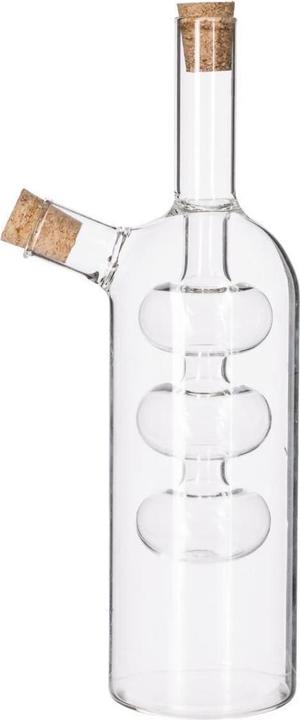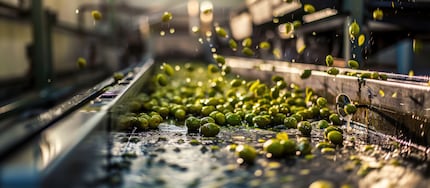

Don’t use olive oil for frying: true or false?
Olive oil has been considered one of the most valuable vegetable oils for thousands of years. The secret? A unique combination of fatty acids, antioxidants and vitamins. But not all olive oil is equally good for your health.
Olive oil’s an indispensable part of Mediterranean cuisine. And the Mediterranean diet’s not considered one of the world’s healthiest diets for nothing. While we like to use olive oil to refine our dishes here, in countries including Spain and Italy, it’s practically the base ingredient used to downright drown vegetables, meat and fish. And rightly so – if you look into its health-promoting properties.
Should you heat olive oil?
Before looking at the health benefits of olive oil, let’s look at whether you should use it for frying or not. It’s a myth that you should never heat olive oil. There are differences depending on how it’s processed, but in general you can use clear olive oil for frying or deep-frying.
However, you shouldn’t heat it above its smoking point. This is where volatile components such as water or free fatty acids evaporate and form visible smoke. Generally speaking, the less processed an oil is, the lower its smoking point. For cold-pressed oils, it’s between 120 and 190 degrees; for more processed (refined) oils, it’s over 200 degrees.
So, you shouldn’t use naturally cloudy olive oil for frying or deep-frying. The residual water and small pieces of pulp it contains mean it reaches its smoking point more quickly.
Heating olive oil moderately retains the bulk of its health-promoting properties. Alternatively, you can simply fry your food in a more heat-resistant oil (e.g. rapeseed oil) and then refine it with high-quality olive oil when serving.
What makes olive oil so good for your heart, nerves and immune system?
The health value of olive oil is based primarily on its fatty acid pattern – 70 to 80 per cent monounsaturated fatty acids, especially oleic acid. These fatty acids help to lower LDL («bad») cholesterol and keep HDL («good») cholesterol stable. Unlike saturated fats from animal sources, unsaturated fatty acids help prevent plaque buildup in the arteries, reducing the risk of cardiovascular disease.
Olive oil also contains a lot of antioxidants. These antioxidants (polyphenols such as oleuropein, hydroxytyrosol and oleocanthal) can neutralise free radicals and reduce DNA damage. They protect your heart and reduce inflammation in the body. This is where the considerable differences between different olive oils come into play: high-quality extra virgin olive oil can contain up to 230 mg of polyphenols per kilogramme, while refined oils often contain even less than 60 mg.
One of the largest studies on the Mediterranean diet shows that four tablespoons of extra virgin olive oil a day reduces the risk of cardiovascular disease by 30 per cent. And that’s not all: it can also improve insulin sensitivity, reducing the risk of diabetes.
In addition, substances such as oleocanthal in olive oil can cross the blood-brain barrier and slow down nerve-damaging processes. The active ingredients inhibit the accumulation of amyloid-beta plaques, which are associated with Alzheimer’s.
Quality criteria: what to look for when buying olive oil
The quality of olive oil depends heavily on where the olives come from and when they’re harvested and processed. Make sure that the oil comes from controlled cultivation and is as fresh as possible. Olives harvested early (September to early November) contain the highest concentrations of polyphenols and antioxidants.

Source: gadiel img/Shutterstock
Extra virgin, virgin olive oil, cold pressed – what does it all mean?
In Germany and Switzerland, olive oil is divided into three quality classes that differ in their sensory properties and free fatty acid content. The fewer free fatty acids there are, the fewer bitter substances there are and the higher the quality of the oil.
Native or virgin olive oil may contain up to two grammes of free fatty acids per 100 grammes. In Switzerland, the term «virgin» has been established for this class in the retail sector. Native oil has to be natural. This means that only mechanical processes may be used to produce it, it’s cold-pressed or cold-extracted and no additives such as solvents are allowed. This ensures that the olives’ natural aromas, vitamins and antioxidants are preserved.
Extra virgin olive oil is the highest quality, containing a maximum of 0.8 grammes of free fatty acids per 100 grammes.
Grade 5 olive oil is a mixture of hot-pressed (refined) and cold-pressed (virgin) olive oil. It can have an acidity of up to 1.5 per cent.
Science editor and biologist. I love animals and am fascinated by plants, their abilities and everything you can do with them. That's why my favourite place is always the outdoors - somewhere in nature, preferably in my wild garden.
Practical solutions for everyday problems with technology, household hacks and much more.
Show all




